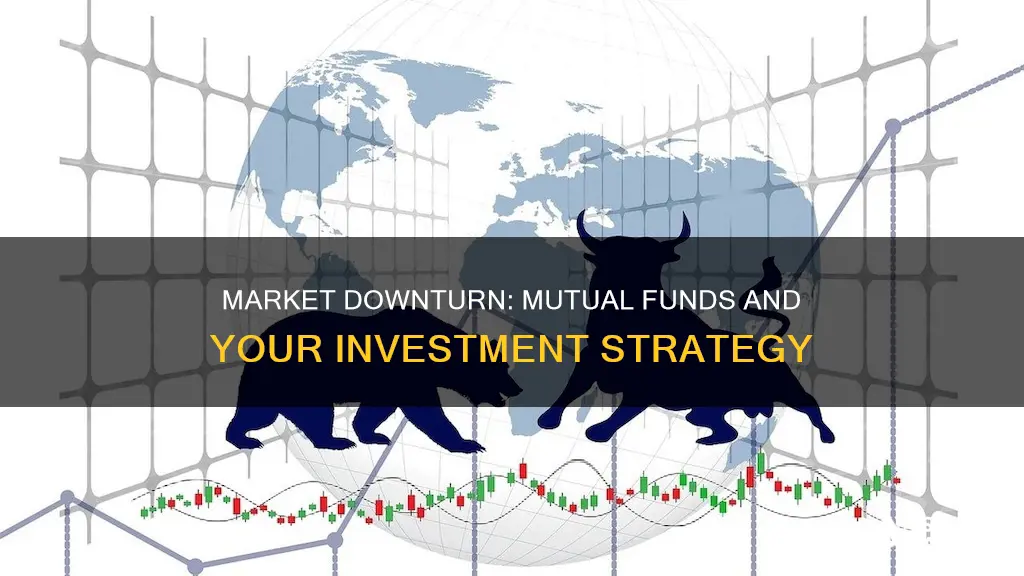
Investing in mutual funds is a popular option for those who want to benefit from the stock market's high average annual returns without picking and choosing individual investments. Mutual funds are also considered safer and less complicated than other investment options. When the market is low, some investors may be tempted to sell their shares or units of mutual funds, while others may wonder if it is the right time to invest. Investing in mutual funds when the market is low can be a good strategy as it allows you to purchase more units at a lower price, potentially leading to higher profits when the market rises. However, timing the market is challenging, and it is difficult to predict market movements. Therefore, a more disciplined approach is to focus on long-term investment in equity mutual funds, regardless of short-term market fluctuations. Systematic Investment Plans (SIPs) are a recommended mode of investment in this case, allowing investors to benefit from overall economic growth in the long run.
| Characteristics | Values |
|---|---|
| Should you invest in mutual funds when the market is low? | Yes, but don't focus on timing the market. Instead, keep investing in equity mutual funds regardless of market fluctuations. |
| Pros of investing in mutual funds when the market is low | You get to purchase more mutual fund units when the market is down, so you will make more profit when the prices rise. |
| Cons of investing in mutual funds when the market is low | It's impossible to predict the market. What if the market goes down even further? |
| Recommended mode of investment in mutual funds | Systematic Investment Plan (SIP) |
What You'll Learn

Mutual funds vs. individual stocks
Mutual funds and stocks are both useful starting points for investors as they are very liquid and don't require much capital. However, they suit different investing styles. Here is a comparison of mutual funds and individual stocks.
Diversification
Mutual funds offer instant diversification, which is one of the primary reasons why an individual may choose them over stocks. A mutual fund may be comprised of dozens of different securities, and investors can put a small amount of money into one or more funds to access a diverse pool of investment options.
With stocks, investors can still achieve diversification by accumulating multiple stocks, but they have to analyze the underlying companies and monitor their holdings.
Control
Mutual funds require investors to give up some control. When investing in mutual funds, you give control to the fund manager, who decides on the individual holdings, and you cannot control capital gains. You also have to wait until the end of the day to sell your holdings.
With stocks, you are in control of your portfolio and capital gains. You can adjust your portfolio as you see fit and sell your stocks right away.
Time Commitment
Mutual funds are more hands-off and require less time commitment. You can buy them and barely monitor your investment portfolio. It's also easier to set up automatic transfers to these funds.
Investing in stocks, on the other hand, takes more time. You have to research individual companies, look at earnings reports, compare competitors, and learn about how the stock market works. Even once you have the foundational knowledge, you still have to monitor your investments to ensure they have the same catalysts as when you first purchased the shares.
Fees
Mutual funds have an annual fee, or expense ratio, taken off the value of each share. Actively managed funds have considerably higher fees than passively managed funds.
With stocks, you can avoid fund fees, but the costs of frequent stock trades can add up quickly for individual investors.
Risk
Mutual funds are often safer and are good for investors looking to diversify their portfolios. They reduce investment risk by investing in different securities to try and minimize portfolio risk.
Individual stocks carry more risk than mutual funds, known as unsystematic risk. This is the risk that can be diversified against. For example, by owning just one stock, you are exposed to company-specific risk, such as the CEO and executive team leaving unexpectedly or a natural disaster hitting a manufacturing center.
Fidelity Mutual Funds: Investing in Corporate Debt
You may want to see also

The pros of mutual funds
Investing in mutual funds is a popular option for those who don't want to pick and choose individual investments but still want to benefit from the stock market's high average annual returns. Here are some pros of investing in mutual funds:
Diversification
Mutual funds offer instant diversification by allowing investors to access a wide range of securities and industries with a single investment. This helps to minimize portfolio risk and protect against potential losses. Most experts agree that a portfolio should hold stock in at least 20 different companies to realize the benefits of diversification. Mutual funds also provide exposure to different sectors, such as technology, healthcare, or raw materials.
Convenience
Mutual funds offer a convenient way to invest by allowing investors to defer allocation decisions to experts. Investors can buy into a mutual fund that meets their basic investment criteria, rather than researching and purchasing individual stocks. This also means relying on a money manager to determine the asset allocation of the portfolio, which can benefit from their expertise and understanding of the stock market.
Lower Costs
Mutual funds can offer lower costs compared to investing in individual stocks. The cost of trading in a mutual fund is spread over all investors, resulting in a lower cost per individual. Additionally, brokerage firms often charge the same commission for one share or 5,000 shares, making it difficult for an investor to buy into 20 different stocks.
Simplicity and Affordability
Mutual funds are simple and affordable, making them attractive to investors. They are a hands-off way to invest in many different assets at once, and they are highly liquid, meaning they are easy to buy and sell.
Long-Term Growth
Mutual funds are typically considered a long-term investment, and with compound interest, they can lead to significant growth over time. While the market may experience short-term fluctuations, these are absorbed in the long run with the overall growth of the economy.
In conclusion, mutual funds offer a range of benefits, including diversification, convenience, lower costs, and simplicity. They are a popular choice for those seeking a relatively hands-off approach to investing and looking to benefit from the stock market's high average annual returns.
Single Investment Strategies to Fund Your Future
You may want to see also

The cons of mutual funds
Investing in mutual funds has its downsides, and here are some of the most significant cons to consider:
High fees and sales charges
Mutual funds come with various fees, such as high expense ratios, sales charges, and operating expense ratios. These fees can eat into your investment returns, so it's important to be cautious and compare different fund companies to find the most cost-effective option.
Tax inefficiency
Mutual funds distribute capital gains payouts to investors, which are often uncontrollable tax events. Dividends and interest payments are generally considered taxable income by the IRS, even if you reinvest the money. Therefore, investing in mutual funds can have tax implications that should be carefully considered.
Poor trade execution
Mutual funds provide a weak execution strategy for investors looking for faster execution times or those with short investment horizons, day trading, or timing the market. The cut-off time for same-day NAV is usually before the market opens, resulting in a delay in trade execution.
Potential management abuses
There is a risk of management abuses, such as churning, turnover, and window dressing. This includes unnecessary trading, excessive replacement of stocks, and selling losing stocks before the quarter-end to improve the appearance of the fund's performance.
No guaranteed returns
Mutual funds do not guarantee returns, and there is always a risk of losing money. Over a five-year period ending in June 2022, only a small percentage of actively managed funds consistently beat the market, according to the S&P Dow Jones Indices. While mutual funds aim to match or outperform the market, there is no assurance of competitive returns.
High minimum investment
Mutual funds often require a minimum investment, which can range from $500 to $3,000. This high minimum investment may be a barrier for some investors, especially those with limited funds.
Maximizing Your SEP IRA: A Guide to Smart Investing
You may want to see also

Mutual funds are not guaranteed returns
Mutual funds are a popular investment avenue for investors, given the wide range of products based on varied investment requirements. However, it is important to remember that mutual funds do not offer guaranteed returns. Here are some key points to understand why mutual funds are not guaranteed returns:
- Mutual funds are not an investment by themselves but a vehicle to invest in various avenues. The money put into a mutual fund is invested by professional fund managers in line with the scheme's objective. The performance of these investments impacts the returns generated by the mutual fund scheme.
- The deciding factors for returns include the movement of the specific market, the performance of individual securities held, and the skills of the investment management team. Out of these factors, the fund manager can only control their skills, while the other factors are beyond their control.
- The returns generated by the markets cannot be guaranteed, and thus, the fund does not guarantee any returns to the unit holders. Even debt or liquid mutual funds, which invest in fixed-income securities, cannot guarantee returns due to various factors such as credit risk, investment horizon, interest rates, and compound interest.
- A mutual fund is a portfolio of fixed-income securities, and the returns of such a portfolio cannot be guaranteed. If a mutual fund were to offer a guarantee, it would need to absorb all the fluctuations in the returns, which would result in lower returns and increased risk for the fund.
- Mutual funds are open-ended funds, allowing investors to come in and out at different times. This structure protects investors' interests by passing on the risk and return to the fund's investors.
In summary, mutual funds are a way to manage your money through a professional fund management team. However, they do not offer guaranteed returns due to the various factors that impact the performance of the underlying investments.
International Index Funds: Diversify Your Portfolio, Maximize Returns
You may want to see also

Consult a financial advisor
Consulting a financial advisor can be immensely beneficial when considering investing in mutual funds, especially when the market is low. Here are some reasons why seeking professional advice is a wise decision:
- Expertise and Experience: Financial advisors are licensed professionals with extensive knowledge of the market. They have experience navigating different market conditions, including periods of low market performance. Their expertise can help you make informed decisions about investing in mutual funds during market downturns.
- Understanding Your Financial Goals: A financial advisor will take the time to understand your financial objectives, risk tolerance, and investment horizon. By evaluating your financial situation, they can provide tailored advice on whether investing in mutual funds during a market low aligns with your long-term goals and risk profile.
- Strategic Investment Advice: Advisors strategically allocate your money and make investment decisions on your behalf. They can guide you on the types of mutual funds that may be suitable for your situation, considering factors such as diversification, fund performance, and risk management. Their insights can help you identify funds with strong long-term potential, even when the market is experiencing a downturn.
- Market Analysis and Insights: Financial advisors closely monitor market trends and fund performance. They have access to analytical tools and resources that help them make informed decisions. By consulting an advisor, you can gain valuable insights into market conditions, potential risks, and opportunities that may impact your mutual fund investments.
- Risk Management: Evaluating your risk tolerance is a crucial aspect of a financial advisor's role. They can help you understand the risks associated with investing in mutual funds during a market low and ensure that your investment strategy aligns with your comfort level. Advisors can also assist in diversifying your portfolio to mitigate risks and improve your overall investment performance.
- Ongoing Support and Portfolio Management: Financial advisors provide ongoing support and guidance. They proactively manage your portfolio, making adjustments as needed based on market changes. Advisors can help you navigate the complexities of investing, especially during volatile market conditions, ensuring that your investments remain on track to meet your financial goals.
Remember, when choosing a financial advisor, it is essential to select one who is registered, qualified, and has a fiduciary duty to act in your best interest. Their expertise and guidance can help you make well-informed decisions about investing in mutual funds, even during periods of market lows.
Unlocking Numerai Hedge Fund Investment: A Step-by-Step Guide
You may want to see also







